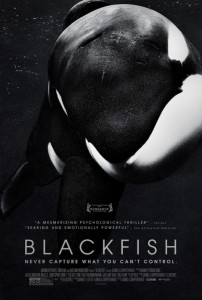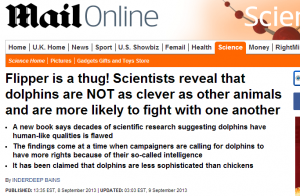The Oscar-winning documentary “The Cove” told the story of the dolphin hunt in the Japanese town of Taiji. Dolphins there are driven into a shallow cove and killed for meat and other products, with a select few set aside alive for sale to dolphinariums. Many are now saying that this year’s documentary on killer whales (Orcinus orca) in captivity, “Blackfish,” will be nominated for next year’s Oscar. Documentaries rarely get many viewers in movie theaters, but Blackfish, which cost only $76,000 to make and was initially released at only five movie theaters, has already grossed about $2 million nationwide and has been ranked among the 10 best performing nature documentaries, which include “March of the Penguins” and the much vaunted IMAX-friendly “Earth” and “Oceans” documentaries.
Blackfish focuses on the four people who have been killed by captive killer whales, bad corporate behavior by marine theme parks (especially SeaWorld) and the ethics of keeping killer whales in captivity. The film focuses particularly on the story of Tilikum, a 12,000lb male killer whale who was captured from Iceland in the early 1980s, has been living at SeaWorld of Florida since 1992, and to date has been involved in the deaths of three people. His last victim, his trainer of six years Dawn Brancheau, was brutally dismembered after he pulled her into the tank with him on February 24, 2010.



